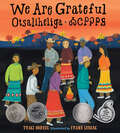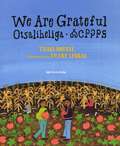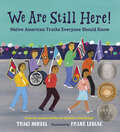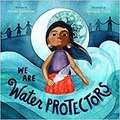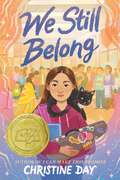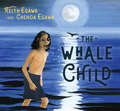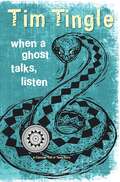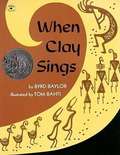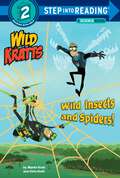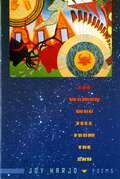Special Collections
NISN Master Book List and Additional Indigenous Literature
Description: NACA Inspired Schools Network Indigenous Literature Master Book List
- Table View
- List View
We Are Grateful: Otsaliheliga
by Traci Sorell2019 Sibert Honor Book2019 Orbis Pictus Honor BookNPR's Guide To 2018&’s Great Reads2018 Book Launch Award (SCBWI)Kirkus Reviews Best Books of 2018School Library Journal Best Books of 20182018 JLG selection2019 Reading the West Picture Book AwardThe Cherokee community is grateful for blessings and challenges that each season brings. This is modern Native American life as told by an enrolled citizen of the Cherokee Nation.The word otsaliheliga (oh-jah-LEE-hay-lee-gah) is used by members of the Cherokee Nation to express gratitude. Beginning in the fall with the new year and ending in summer, follow a full Cherokee year of celebrations and experiences. Written by a citizen of the Cherokee Nation, this look at one group of Native Americans is appended with a glossary and the complete Cherokee syllabary, originally created by Sequoyah."A gracious, warm, and loving celebration of community and gratitude"—Kirkus Reviews STARRED REVIEW"The book underscores the importance of traditions and carrying on a Cherokee way of life"—Horn Book STARRED REVIEW"This informative and authentic introduction to a thriving ancestral and ceremonial way of life is perfect for holiday and family sharing"—School Library Journal STARRED REVIEW"An elegant representation"—Shelf Awareness STARRED REVIEW
We Are Grateful Otsaliheliga
by Traci SorellThe book underscores the importance of traditions and carrying on a Cherokee way of life.
We Are Still Here!
by Traci SorellTwelve Native American kids present historical and contemporary laws, policies, struggles, and victories in Native life, each with a powerful refrain: We are still here!
Too often, Native American history is treated as a finished chapter instead of relevant and ongoing. This companion book to the award-winning We Are Grateful: Otsaliheliga offers readers everything they never learned in school about Native American people's past, present, and future. Precise, lyrical writing presents topics including: forced assimilation (such as boarding schools), land allotment and Native tribal reorganization, termination (the US government not recognizing tribes as nations), Native urban relocation (from reservations), self-determination (tribal self-empowerment), Native civil rights, the Indian Child Welfare Act (ICWA), religious freedom, economic development (including casino development), Native language revival efforts, cultural persistence, and nationhood.
Advisory: Bookshare has learned that this book offers only partial accessibility. We have kept it in the collection because it is useful for some of our members. Benetech is actively working on projects to improve accessibility issues such as these.
We Are Water Protectors
by Carole LindstromInspired by the many Indigenous-led movements across North America, We Are Water Protectors issues an urgent rallying cry to safeguard the Earth’s water from harm and corruption―a bold and lyrical picture book written by Carole Lindstrom and vibrantly illustrated by Michaela Goade. Water is the first medicine. It affects and connects us all . . . When a black snake threatens to destroy the Earth And poison her people’s water, one young water protector Takes a stand to defend Earth’s most sacred resource.
We Still Belong
by Christine DayA thoughtful and heartfelt middle grade novel by American Indian Youth Literature Honor–winning author Christine Day (Upper Skagit), about a girl whose hopeful plans for Indigenous Peoples’ Day (and plans to ask her crush to the school dance) go all wrong—until she finds herself surrounded by the love of her Indigenous family and community at an intertribal powwow.Wesley is proud of the poem she wrote for Indigenous Peoples’ Day—but the reaction from a teacher makes her wonder if expressing herself is important enough. And due to the specific tribal laws of her family’s Nation, Wesley is unable to enroll in the Upper Skagit tribe and is left feeling “not Native enough.” Through the course of the novel, with the help of her family and friends, she comes to embrace her own place within the Native community.Christine Day's debut, I Can Make This Promise, was an American Indian Library Association Youth Literature Award Honor Book, was named a Best Book of the Year by Kirkus, School Library Journal, the Chicago Public Library, and NPR, and was also picked as a Charlotte Huck Honor Book. Her sophomore novel, The Sea in Winter, was an American Indian Library Association Youth Literature Award Honor Book, as well as named a Best Book of the Year by Kirkus and School Library Journal. We Still Belong is an accessible, enjoyable, and important novel from an author who always delivers.
The Whale Child
by Keith Egawa and Chenoa EgawaAn inspiring middle-grade chapter book that introduces young readers to the environmental challenges facing the planet through the eyes of Coast Salish characters and authors."You have family on land as you do in the sea. . . being a caretaker of the earth begins with taking care of the water that all life depends on."Shiny is a whale child. One day his mother teaches him about the harm facing the world's oceans because of human carelessness. Shiny agrees to be turned into a boy by the ocean's water spirit so he can visit the land and alert people to these dangers. He meets Alex, a young Coast Salish girl who learns from Shiny that the living spirit of water exists in everything--glaciers, rivers, oceans, rain, plants, and all living creatures. Together the two travel the earth, confronting the realities of a planet threatened by an uncertain future. Inspired by Shiny's hope, humor, and wisdom, Alex makes the promise to become a teacher for future generations. She realizes that the timeless Indigenous value of environmental stewardship is needed now more than ever and that we must all stand up on behalf of Mother Earth. Written and illustrated by Indigenous authors Keith Egawa and Chenoa Egawa, The Whale Child introduces children ages 7 to 12 to existing environmental issues with a message of hope, education, sharing, and action. Ideal for middle-grade readers who are beginning to read chapter books on their own, this book also includes resources for students and teachers to facilitate learning about Pacific Northwest Indigenous cultures and the environment.
When a Ghost Talks, Listen
by Tim TingleTen-year-old Isaac, now a ghost, continues with his people as they walk the Choctaw Trail of Tears headed to Indian Territory in what will one day become Oklahoma. There have been surprises aplenty on their trek, but now Isaac and his three Choctaw comrades learn they can time travel--making for an unexpected adventure. The foursome heads back in time to Washington, D.C., to bear witness for Choctaw Chief Pushmataha who has come to the nation's capital at the invitation of his dear friend Andrew Jackson. You cannot blame the people before you for mistakes their ancestors made, Chief Pushmataha tells the little band. In doing so, the general makes a powerful and timeless lesson, one made more so as the reader travels from graveyards to boarding schools, from 1824 to 2018, experiencing firsthand the joy of never leaving.
When Clay Sings
by Byrd BaylorBased on the original pottery of the ancient Anasazi, Mogollon, Hohokam and Mimbres cultures, the writer imagines the reasons for the making of the pottery and its creation.
A beautifully-illustrated prose poem for preschool through grade 3 and older readers. These few words convey much about the role of pottery in the Southwestern Native-American culture.
Winner of the Caldecott Honor
Wild Insects and Spiders!
by Chris Kratt and Martin KrattPBS&’s successful animated show Wild Kratts joins the adventures of zoologists Chris and Martin Kratt as they travel to animal habitats around the globe. Along the way, they encounter incredible creatures while combining science education with fun. Boys and girls ages 4 to 6 will love this Step 2 Step into Reading leveled reader, in which they activate their Creature Power Suits to buzz the insect kingdom!
The Woman Who Fell from the Sky
by Joy HarjoJoy Harjo, one of this country's foremost Native American voices, combines elements of storytelling, prayer, and song, informed by her interest in jazz and by her North American tribal background, in this, her fourth volume of poetry. She draws from the Native American tradition of praising the land and the spirit, the realities of American culture, and the concept of feminine individuality.
